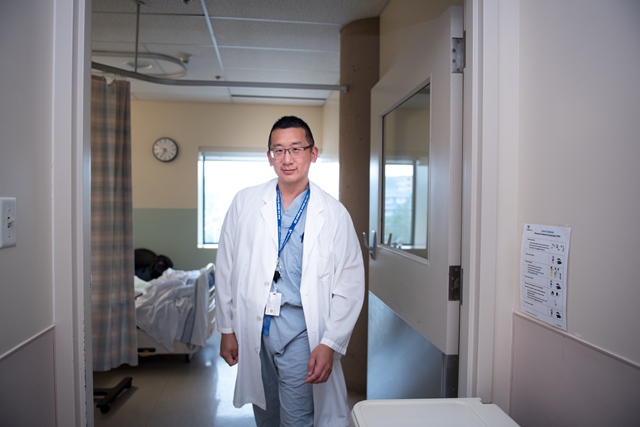By Elaine O’Connor
Dr. John Hwang started with an idea: look beyond the key performance indicators to patients for quality improvement initiatives.
In 2013, the general surgeon moved out of the operating room and into data-driven healthcare innovation as the National Surgical Quality Improvement Program (NSQIP) Surgical Champion at Fraser Health Authority’s Royal Columbian Hospital in New Westminster, B.C.
His role is to help surgical teams reduce complications and enhance post-operative patients’ recoveries so they can be independent at home sooner, which reduces the burden of long stays on the system and improves patient outcomes. It’s a complex task.
“Royal Columbian is a big hospital and we can see a lot of complications, because we do such complex surgeries,” explained Dr. Hwang. “Yet something you notice is that the quality improvement numbers never really change, and I wondered why.”
He found the key at a conference in the U.S. where he learned front-line engagement and employee-driven quality improvement delivered longer term success.
So in 2015 he set out to reinvent quality improvement at the hospital.
“We start with the patient experience,” Dr. Hwang says. “We develop relationships with our patients, our nurses, our frontline employees and we ask them what is going well that we can duplicate and what is not going well that we can improve. You gauge success on whether patients say their experience is better. If you can improve their experience, then the numbers usually improve.”
Now, this surgeon and his team are placing a stronger focus on patient experience as a driver for change. With data in hand, they are beginning at the bedside: asking patients themselves what could help them recover more effectively after surgery.
Dr. Hwang collaborated with Fraser Health leadership, surgical quality team, and hospital foundation to create a set of surgical check-ins, workshops for frontline employees, and an annual surgical research day event. Employees generated their own quality improvement initiatives with quality improvement grants from the foundation and NSQIP data was made more accessible and actionable for care providers.
The team has used this method with vascular surgery patients, who were staying in hospital for weeks to a month more than the standard three to five days, and sometimes returned with infections or complications. Nurses identified the issue was that patients didn’t feel secure enough to recover at home. So the nursing team’s #Sendmehome project created an educational discharge package for patients, complete with hand sanitizer, numbers to call if something goes wrong and follow-up phone check-ins.
These initiatives helped promote safe discharges, while operational changes, including the hiring of a nurse practitioner and creation of a vascular wound outpatient clinic contributed to the work. The result? Average length of stays are down significantly – from a high of approximately 20 days in January 2017 to 4.5 days in July – and hospital management is convinced they will stay there.
For his efforts, Dr. Hwang was honoured with a Fraser Health Above and Beyond Awards Innovator Award in September.
“He has changed the culture on my surgical units and has inspired my managers and frontline employees to make quality improvement a part of their daily work,” said Barb Sutherland, Royal Columbian Hospital’s Clinical Director for Surgery. “He will not be satisfied until we have no hospital infections.”
Read his full story and watch a video on Dr. Hwang’s work here: http://news.fraserhealth.ca/News/September-2017/Dr-John-Hwang-Innovator-Award.aspx.
Elaine O’Connor is Senior Consultant, Communications at Fraser Health in BC.




